No doubt about it, eating enough calcium is a critical part of a healthy diet for people who have calcium kidney stones. But, what is the best way to eat enough calcium?
*Please note that this post contains clearly identified affiliate links. If you click on these link and choose to make a purchase, I may receive a commission (at no cost to you).
Table of Contents
Why Is Calcium So Important?
Block Oxalate Absorption
It may seem counterintuitive to eat MORE calcium when you have calcium kidney stones. But, hear me out.
The first reason eating enough calcium is so important is to reduce how much oxalate is absorbed. (1)
Calcium loves to bind with oxalate – this is why it is the most common type of kidney stone. We can use that love to our advantage by pairing high calcium foods with meals. When calcium is eaten with healthy meals that have oxalate in them, calcium will bind with oxalate in the intestine. Bound oxalate cannot get absorbed into the body. In turn, this will reduce the amount of oxalate in our urine and reduce the risk of kidney stones.
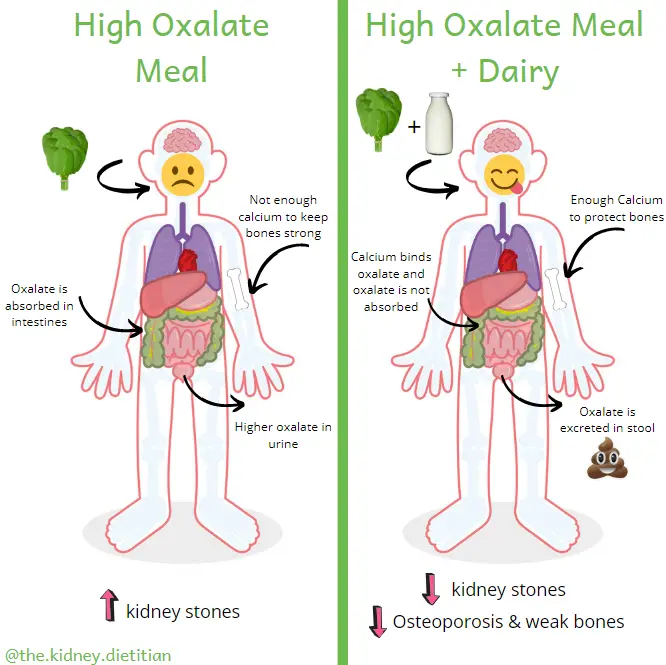
Protect Your Bones
The second reason calcium is so important for people with calcium kidney stones is bone health. People who have calcium kidney stones are at greater risk of bone fractures and weak bones. (2)
Eating enough calcium and vitamin D can help keep bones healthy and strong.
How Much Calcium Do I Need?
People with calcium kidney stones need the same amount of calcium as the general population. It is just even more important that people with calcium kidney stones meet their calcium goals!
Aim for 1,000 – 1,200mg of calcium per day.(3) (4)
One serving of dairy has 200-300mg of calcium. Ideally, eat one serving of dairy with 3 meals per day. These 3 servings of dairy, combined with small amounts of calcium from other foods, is a good way to be pretty sure you are eating enough calcium.
One serving of dairy is:
- 1 cup of milk or kefir
- 3/4 cup of yogurt or low-sodium cottage cheese
- 1 ounce of cheese – look for lower sodium cheeses like goat, mozzarella or Swiss
I’ve written a cookbook that includes dairy in all the recipes. I know that drinking milk with every meal can get boring!
Cow’s Milk Dairy First
When at all possible, I recommend cow’s milk dairy for people who have calcium kidney stones. Cow’s milk and dairy are, by far, the most calcium dense foods. And, dairy has lowered kidney stone risk in studies.(5)
If you have kidney disease in addition to kidney stones, the best milk for you might be different.
Skim vs. Whole Milk
The amount of fat in milk has little effect on the calcium amount. Skim, 1%, 2% and whole milk have basically the same amount of calcium.
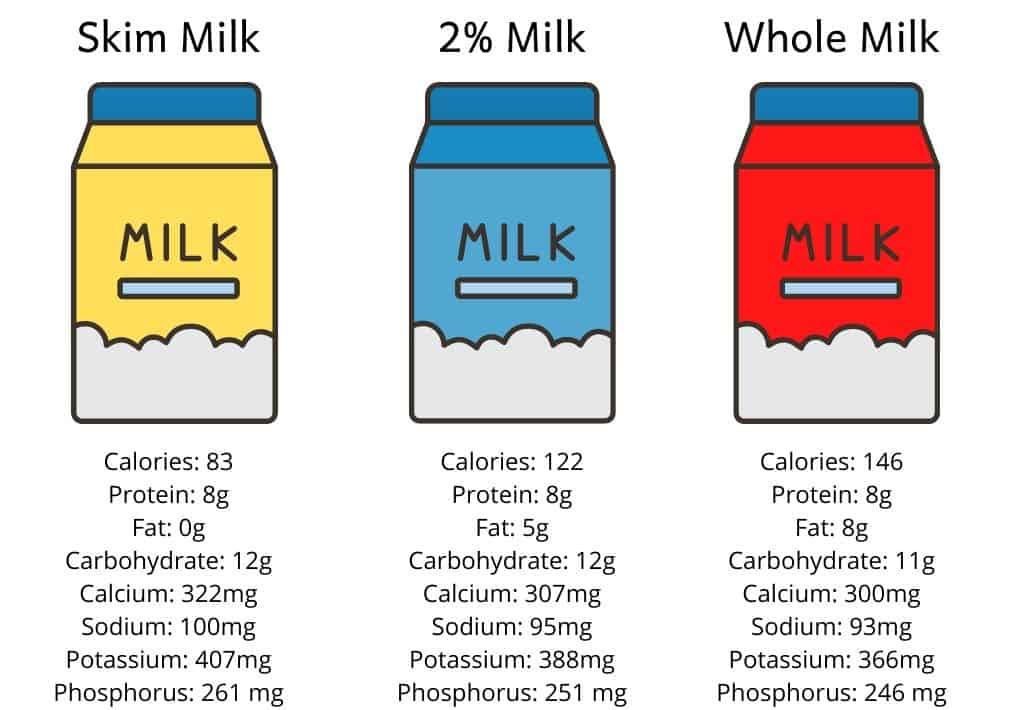
The one exception is dairy with a very high fat content. Foods like cream, cream cheese and sour cream are much lower in calcium.
Of course, the higher the fat content, the higher the calories and fat. For most people, I recommend fat-free or low-fat dairy.
Tips for Lactose Intolerance
The most common reason for milk intolerance is difficulty digesting lactose. Lactose is a sugar found in dairy. We need an enzyme called lactase to digest lactose. Without enough lactase, dairy can cause gas, diarrhea, cramping and other uncomfortable symptoms.
Start Slowly
The good news is that you can train your body make lactase again! Rather than dive in with 3 servings of dairy per day, start with just one (or even a half!) serving each day. Assess your symptoms for a few weeks and go up from there.
Start with Cheese or Yogurt
Cheese and yogurt tend to have less lactose in them. People who cannot tolerate milk often can tolerate cheese or yogurt.
Try Low Lactose Milk
Lactaid* and other lactose free dairy is a great option for people who have kidney stones.
You can also try Lactaid* in pill form when you eat dairy.
Good Non-Dairy Calcium Sources for Kidney Stones
Of course, milk is not for everyone. Many people avoid dairy due to cultural, religious, ethical or environmental reasons.
Of note, dairy has not been shown to cause inflammation in rigorous scientific studies. In fact, dairy has been shown to be anti-inflammatory in some cases. (6)(7)(8)
Most plant-based and non-dairy milk substitutes are supplemented with calcium. Because we know that calcium supplements tend to increase urine calcium more than natural sources, this is somewhat of a concern. However, no research has investigated the difference in urine calcium after consumption of natural and calcium supplemented foods.
Some calcium is certainly better than no calcium. Calcium from both dairy and non-dairy sources has been shown to reduce the risk of kidney stones.(9)
For people with a history of calcium kidney stones, dairy substitutes made from these milks are good choices.
- Rice Milk
- Oat Milk
- Coconut Milk
- Hemp Milk
- Pea Milk
Double check that the brand you buy is supplemented with calcium.
Dairy Substitutes NOT Recommended for Kidney Stones
These dairy substitutes are made from foods high in oxalate. Because oxalate is water soluble, it is a fair assumption that any liquid made from these foods will contain oxalate.
Although not everyone with kidney stones needs to avoid oxalate, I would recommend steering clear of these options. Adding these milk substitutes 3 times per day could add a very large oxalate load.
I do not recommend these milk substitutes for people with calcium kidney stones:
- Almond Milk
- Cashew Milk
- Soy Milk
Calcium From Plant Sources
Some plant foods are surprisingly high in calcium! These foods all have at least 60mg of calcium per serving (1 cup unless otherwise specified):
- Collard greens
- Spinach
- Kale
- Soybeans
- Broccoli
- Broccoli rabe
- Chia seeds (2 tablespoons)
- Tofu
- Edamame
- Okra
- Sunflower seeds (1/4 cup)
- Almonds
Italicized foods are higher in oxalate and not recommended for people with high urine oxalate levels.
However, the amount of calcium in most of these foods is still far less than dairy.
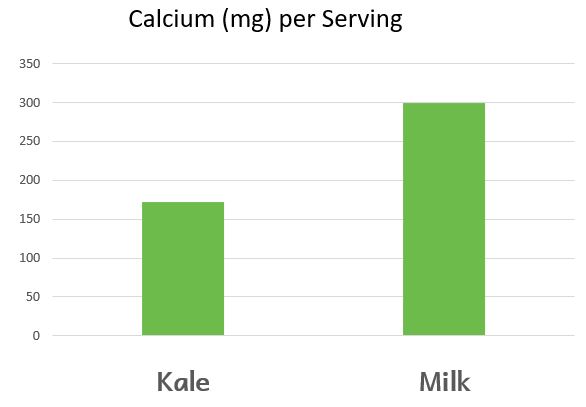
Importantly, calcium from these plant foods is not absorbed as well compared to dairy. Many of these foods are high in oxalate. Calcium is already bound to oxalate (and other compounds called “phytates“), which reduces absorption. In addition, because calcium is already found to oxalate, it will not do as good a job of binding other oxalate in that meal.
However, eating lots of fruits and vegetables is critical for kidney stone prevention.(1) Including some high calcium veggies can absolutely help get your to our daily goal of 1,000 – 1,200mg of calcium.
Calcium Supplements
Many patients ask “why can’t I just take a calcium supplement?”. Although this may seem like an easy fix, calcium supplements are not always the best choice for people with kidney stones.
The concern with calcium supplements is that supplemental calcium is much more likely to raise urine calcium than calcium that naturally occurs in food. This is very problematic for kidney stone formers because high urine calcium is the most common cause of calcium kidney stones.(1)
However, calcium supplements may be warranted in some people with kidney stones. Especially if urine calcium is normal. Work with your doctor to figure out what is best for you.
Happy Eating!
Melanie

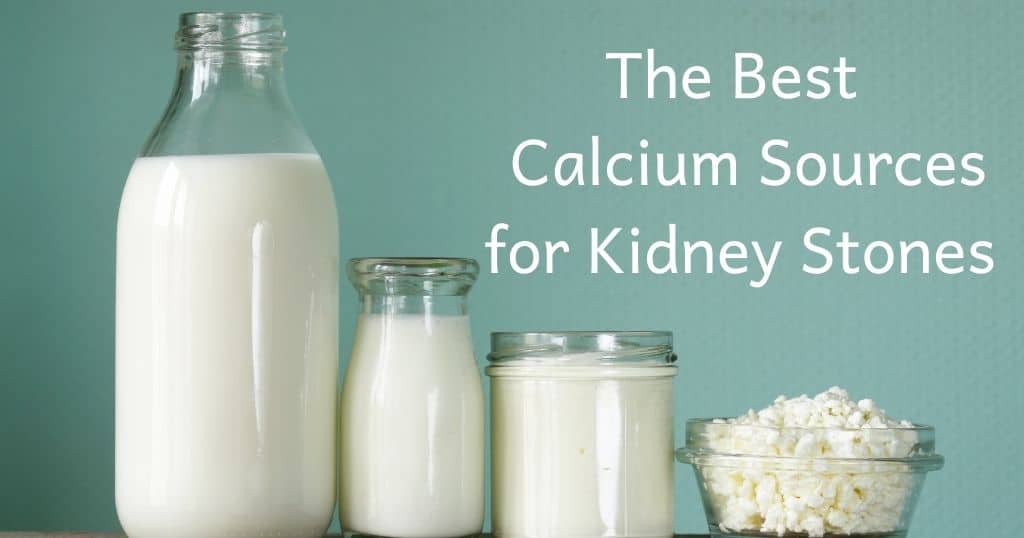
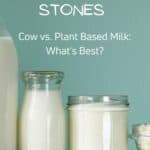
Hi – In your emailing from today, you say that excess urine calcium means that the calcium is coming (leaching) from your bones. Why is that? Why would the body need to break down bone for more calcium? Does that only happen if there is not enough calcium for other crucial – non bone building – bodily processes? What if instead of getting too little calcium, you get too much? Wouldn’t the extra be secreted in urine as well?
Not necessarily. The most common cause of stones is something called “idiopathic hypercalciuria” – meaning that your body keeps breaking down bone and excreting it in urine for some unknown reason. There is likely a big genetic component here. For some reason, some bodies just really want to work to keep that urine calcium high!
Thanks. But I would still guess that if one is in the habit of consuming 5000 mg of dairy calcium (to use your preferred source), there will be plenty of left over calcium that’s not needed for bones or for other physiological processes (and that doesn’t happen to be fortunate enough to bind to oxalate), that that excess calcium would be excreted in urine.
I never suggest eating 5,000mg of calcium – this is way too much. The recommendation is 1000-1200mg/day.
Hi Melanie’
I had an operation in 2016 for hyperparathyroidism. The parathyroid gland was not found and I was put on medication. Unfortunately I was readmitted afterwards and diagnosed with AFIB and Sick Sinus heart conditions.
With this diagnoses in mind, I added sweet potatoes, celery, beets, and other heart friendly foods to my diet.
Four years later I was diagnosed with 10 kidney stones, which I know were not there in 2016. My blood calcium levels have been normal for several years and I have recently been told that CT scans reveal no increase in my stone load.
I do not know what my urine calcium levels are, but I would dearly love to eat a more varied diet, particularly things like pasta and bolognaise sauce for instance.
I have been trying to keep oxalates down to between 60 and 10 , mainly because research on this subject recommends that sort of level. But a lot of my favourite food are high in oxalates. I am 82, and female
Hi there! I’d highly recommend getting a 24 hour urine test to see if high oxalate is your issue. With that history, my guess is you are forming stones due to high urine calcium, and strictly controlling your oxalate won’t do a thing to prevent stones for you. Even if your urine oxalate is high, I would never recommend reducing oxalate that low because you simply are unable to eat a healthy, varied diet with that low of an oxalate goal. There are many other things we can do to get that oxalate down other than staying away from those favorite foods!
OMG, everyone, I am new to all of this Kidney Stone ‘Drama’ I like to call it. It has consumed my life. I had a kidney stone 10 yr ago. Had no clue, rush to the hospital in UTAH) , put to sleep, woke up, sent home, never look back. Never told anything, and I was to dumb to ask. Well here I am, at work, sudden unberable pain, not knowing, threw up, all of the above. Note: I change my life 2016 to plant based foods. No dairy, cheese, nothing of the sort. OMG. June 19, 2022, It hit, an 8mm stone attempting to pass, according to the hospital. sent home with results which stated more stones in my kidney. I did not go to a Urologist right away. Instead I took CHANCA PIERDRE (stone breaker)..(this is supposed to break stones).. not sure, But July 24, I passed 2 stones. (I was later told, once I did see the urologist on 8-4-2022, that I have three 2.3MM stones on the right and two 4MM on the left…….SO I am freaking out. Afraid to eat and I am already thin..I just started doing research on this…I refuse to have any surgeries. So now I have to revise my 5 yr plant-based diet accordingly. I have to get rid of the existing stones and nveer get another.
Hi Redfeetrock,
I have been on a plant-based diet for 9 years. I had 3 large kidney stones 10 years ago and this year I had 3 small ones. It turns out that my urologist gave me the 24-hour urine test and I had low citric acid and was not drinking enough water. Eating a plant-based diet is fine if you just make sure that you get the urine test and see what types of stones you have. If they are calcium oxalate, make sure that you are careful to stay away from the highest oxalate foods: almonds, beets, spinach, rhubard, and kidney beans. I eat lots of broccoli, collards, all kinds of greens except spinach, oat milk, oat milk yogurt, and stay away from soy milk and yogurt. My urologist told me that she always has lots of oat milk products in her house.
I am hopeful that adding a bit of lemon juice to my water will up the citric acid enough and I can keep going with eating plants.
If you are in doubt, sign up for Melanie’s class. I’m about to do that anyway just to see what else I can learn.
What about not having a large colon ? How does all this come into play ? As far as absorbing the calcium from the milk etc. I have a j-pouch ; large Colon was removed in2009 with them making a jpouch out of a portion of my sm intestine.
Thank you 🙂
Any sort of GI surgery can definitely impact the approach to stone prevention. This article about gastric bypass surgery will help explain a bit more!
I had too many stones to count at age 60.Found on CT scan. I never passed or felt pain. So obviously I am a stone former. Four years later I have 3 more stones. What can you say about adding dry milk powder to foods and drinks to increase their calcium amounts?
Hi Joyce! That is a wonderful idea that I truly haven’t thought of before! You could definitely do that if you need to work on getting in more calcium. One serving of dry milk powder is 1/4 cup!
“Most plant-based and non-dairy milk substitutes are supplemented with calcium. Because we know that calcium supplements tend to increase urine calcium more than natural sources, this is somewhat of a concern. However, no research has investigated the difference in urine calcium after consumption of natural and calcium supplemented foods.”
I’m confused by this statement. If no research has been done, then why are calcium supplements not advisable?
Is a fortified food any safer than taking a standalone pill?
I have high urine calcium but normal urinary oxalate. I have been faithfully consuming dairy 3 x a day and still this has not decreased my urinary calcium. Diuretics have done nothing to decrease it either. I’m at wit’s end and am tired of dairy and worried about heart health related to dairy.
Hi Jason! Research has definitely been done that shows calcium SUPPLEMENTS (pills) increase urine calcium much more than natural sources of calcium (like cow’s milk). But no research has shown if calcium supplements FOODS (like plant based milks) have a more similar impact as pills or natural sources of calcium. I know figuring out this calcium piece can be confusing! I’d love to help you learn what is best for you – based on your urine test results and current eating habits. This is exactly what I help people do in Kidney Stone Nutrition School!
Does Kidney stone nutrition school teaches/includes how to prevent kidney stone while maintaining a plant base diet for people that can’t do dairy or animal protein…..My issue is HyperOXalate, Hyperkalemia ,CKD 3b….. was avoiding food high in phos thus not doing dairy….got the low oxalate beans and nuts list but not sure if this option of protein puts me at risk for kidney stone…I’m trying to help kidney but not eating meat , less renal workload but the choices have oxalate…..I use to take yogurt to help this out now that I drop dairy this is not possible anymore……what to do?
Absolutely! Kidney Stone Nutrition School doesn’t promote or endorse a single dietary pattern. Instead, it will help you understand what aspects of nutrition actually matter for stone prevention for YOU – and then how to apply them to a dietary pattern that you enjoy and works for you! I have had many students who follow a plant based diet for stone prevention with a LOT of success. There are actually plenty of benefits of a plant based diet for stone prevention!
If a person is taking a calcium supplement, isn’t calcium citrate helpful in reducing the possibility of kidney stones because of the citrate? Also, will lemon water be helpful to reduce the possibility of stones?
Thanks again!
Hello! The answer to this completely depends on your 24 hour urine test results. With high urine calcium, you definitely want to avoid ANY calcium supplementation. Lemon juice can be helpful for some people (again, depends on those urine test results) – but you need a pretty substantial amount of lemon juice to really move the needle for stone prevention. A wedge or two in water isn’t usually going to cut it. I help people prevent kidney stones with this personalized approach in Kidney Stone Nutrition School!
If one avoids dairy, and green vegetables are not the best substitute as a calcium source with meals, can bone-in canned fish and crushed eggshells stand in fine? Yes, it’s safe to consume completely pulverized egg shells. They are reliably high in calcium, as one could assume. Additionally, what about ocean vegetables like seaweed? I am under the impression that most, if not all, seaweeds are low oxalate. I don’t know if that is accurate however. Thank you for your response.
Hi Bette! Bone-in fish could be a good option. I’d be careful with seaweed, as it is incredibly high in sodium. Ultimately, I can’t say what is best for you and what your priorities should be here without reviewing your 24-hour urine test results, medical history and current eating habits!
Thank you so much. Yes, I forgot about the sodium content for a minute! Oops. I was just trying to think of food calcium sources, as opposed to supplements. It’s easy enough to switch to bone-in fish (and eggshells, which I have the go ahead on, based on my medical history).
I am so glad I found you ! I have received conflicting advice from my providers.
I have had two calcium oxalate stones. The 24 urine test shows I have high calcium. My doctor recommended a low oxalate diet. But after reading your article, I see that protein, sugar and salt are what I should cut back on. Am I correct?
I am dairy intolerant. Lactose does not help… seems it’s the milk protein I can’t digest. Do I still need to find alternate sources to keep calcium in my diet.? I have been talking a calcium supplement when I consume a meal high in oxalates. ( I do avoid the highest oxalate foods like almonds and spinach).
Thanks for your advice. You are doing a great service.
Claudia
Hi Claudia! Thank you for your kind words. I’m glad you’ve found me as well! That high urine calcium is actually the #1 cause of stones, so you aren’t alone. Yes, eating the right amount of protein, sugar and salt can all help reduce urine calcium. Without knowing what you are eating now, I can’t really say if you are eating too much of these things already. Calcium supplements should DEFINITELY be avoided for people with high urine calcium – they tend to raise urine calcium MUCH more than natural sources of calcium from food. If your urine oxalate wasn’t high, there really isn’t a good reason to avoid higher oxalate foods. I help people put all of this together, and know exactly what to eat based on their 24-hour urine test results, in my course – Kidney Stone Nutrition School. I think you would be a perfect candidate and I would love to help you!
Hi, Melanie – I’m so happy to find you! You mentioned in your alkaline water article about some mineral waters having calcium, and there is a brand that was recommended to me that has 200 mg per bottle so I was going to try it to supplement my intake. But would you say that as a source of calcium it’s inferior to food? Thanks in advance!
Wow! That is a lot of calcium. That calcium does (probably!) function more like calcium from a supplement than naturally occurring calcium. Here is more info about my thoughts about calcium supplements vs food vs supplemented foods!
I am also vegan, no liquid oil and gluten free due to many medical challenges. My last 24 hr. test showed that my calcium was too low. I’ve tried plain, fat-free Greek yogurt on occasion (approx. 1/3 c daily), but I definitely can’t use it daily or in large quantities without serious issues. I notice you don’t mention whey powder. What are your thoughts regarding whey?
Can calcium oxalate kidney stones cause CKD?
Hi Reba! I really can’t comment if whey is right for you or not. Nutrition for stones is different for every person, depending on their 24 hour urine test. I’d work with a dietitian to see what is best for you! And yes, any type of kidney stone does increase your risk of kidney disease.
You more than anyone, is helping to clarify what I need to do so thanks for that.
Thank you so much Tom!
So glad I found you. Just starting this journey. Still waiting on follow up appointments.
That said, I have a general question. If a plant food, say almonds, is high in both calcium and oxalates, and the fact they are already bound up together makes it hard to extrapolate the calcium, wouldn’t they both just pass through the intestine making that food safe to eat? (Assuming that person is on low oxalate diet).
Fyi, I’m an RN, and if I wasn’t 70 years old, I’d go back to school to become a registered dietician. It is such a fascinating subject. And now with all the microbiome stuff that didn’t even exist when I was in school.
Hi Kim! Great question! The answer ultimately is we don’t know. IF high urine oxalate is an issue for you (it isn’t for most people with stones), there is likely not enough calcium in almonds to bind the VERY high oxalate content in the almonds. Although the research isn’t advanced enough for us to know the exact ratio of calcium to bind oxalate, we do know that urine oxalate goes up after eating almonds and spinach, specifically. There really is VERY little calcium in most plant foods, compared to dairy.
I agree the microbiome stuff is FASCINATING – especially it’s role in kidney stones. There is just SO much to know. My thesis was actually about probiotics, so those little bacteria will always hold a special place in my heart!
Any way I can read your thesis? I love reading research. Super enjoyed my research analysis class in college.
Hi Kim! My thesis, specifically isn’t available to the public. But, you can read many of my more recent publications! They are listed here.
Your advice is most helpful
I’m glad I’m on your mailing list,keep em coming!
Thank you so very much for the kind words! I’m so happy you find my stuff helpful!
I thought Hemp is in the Medium to High oxalate catagory so am confused that Hemp milk is recommended.
You don’t have Flax Milk listed here and thought it was as low as Pea milk.
Also, I make my own vegan milk and am curious if it makes a difference.
Thank you for your time in replying.
Hello! According to my database, hemp is low in oxalate, so I recommend it. I take great care to only use reputable sources for oxalate amounts. I use the Harvard list first, and supplement from well trusted databases from there.
Flax and pea milk would also be good choices.
NONE of these plant milks are naturally high in calcium – they are supplemented. So, when you make your own at home, these would not be good sources of calcium.
Hope that helps!
GREAT article. I do realize that water kefir doesn’t have calcium but is homemade water kefir low, or high in oxalates.
Thank you for any information you can provide.
Thank you so much! Water kefir’s oxalate content would depend on what fruits are used to make it. Please do remember that oxalate is not the most important piece of kidney stone prevention! (Trying to take some of the stress out of the situation!) This article goes over what really makes a difference!
Thank you kindly for responding to my questions. I am on a very high learning curb and so confused by all the information partly due to a TBI that challenges me and partly because the internet has a lot of contradictory information.
Thank you again I truly appreciate all the information that you provide here.
You are so welcome! I’m happy to have you!
I’m confused about bran cereals. Are those made with oat bran high in oxalates? What dry cereals are low in oxalates? Thanks
Bran cereals in general would probably be high in oxalate. Check out my low oxalate breakfast ideas for some cereal choices
I also can’t drink a glass of milk, so since I like lattes I have started making my own version. I steam 1 cup of milk, add 1/2 teaspoon of instant coffee and 1/2 of teaspoon or less of sugar. That I can handle without gagging. It works for breakfast time.
Sounds perfect! I love lattes and I love your low sugar version!
I was told to avoid instant coffee if I’m concerned about kidney stones. What is your opinion?
If your urine oxalate is VERY high (on a 24 hour urine test), it might be best to avoid instant coffee. BUT, I’d say for most people it is totally fine. Add some calcium to that coffee 🙂
Milk of any kind makes me gag. I use cashew milk to cook with. I am vegetarian and have stomach issues limiting my ability to eat beans/lentils and many vegetables. I also have to eat a low fat diet and need a high amount of carbohydrates for high demand exercise. The low oxalate recommendations take away all the foods I currently eat leaving little left. Any suggestions. My favorite foods are nuts and chocolate. Vanilla foods aren’t even an option because I won’t eat them.
Hi Virginia! Thank you for your comment. Without knowing your medical history and lab values, it difficult for me to make recommendations for you! I would encourage you to check out all aspects of healthy eating for kidney stones – it is MUCH more than oxalate and, for many people, oxalate is the least important part. I’ve found that many people over restrict oxalate and liberalizing this helps people realize there are many healthy fruits and vegetables they can eat! Hope that helps!
Hi Melanie!
String cheese is an awesome calcium choice and travels well too! Question: Is Stevia sweetener high in oxalate? Online charts are conflicting. Also, how about Monk Fruit Sweetener, is it high in oxalate? Thank you for being here for us! Kindest Regards, JJ 🦋
Love it! String cheese is a GREAT source of calcium for kidney stones! Stevia (the plant) is high in oxalate. But, the consensus is that the the oxalate is removed in processing to make Stevia (the sweetener). So, I characterize it as low oxalate. Hope that helps!
Thank you Melanie for the clarification on Stevia! Is there any information yet on Monk Fruit Sweetener’s oxalate content? I can’t find anything at all about it, even when typing it into PubMed search bars. Thank you! 🦋 JJ
Hi JJ! I’m honestly not sure about monk fruit. I really wouldn’t worry about it. For sweeteners, we are generally using such a small amount it really isn’t going to make that much of a difference in the grand scheme of things! For most people, just avoiding the VERY high oxalate foods (along with getting enough calcium) is enough to bring urine oxalate down to safe levels!
I love this article, thank you. I’ve never been a milk drinker and add strawberry powder to it so I can drink it. Otherwise, I do love calcium.
Love it! Be careful of the sugar in powders like that. But, a small amount is likely fine!